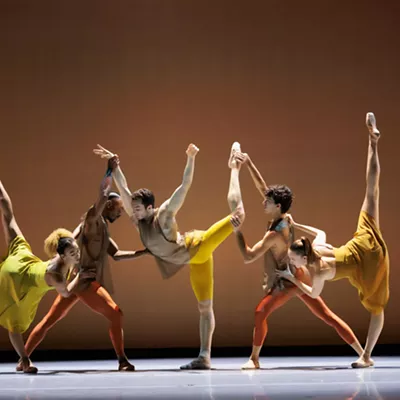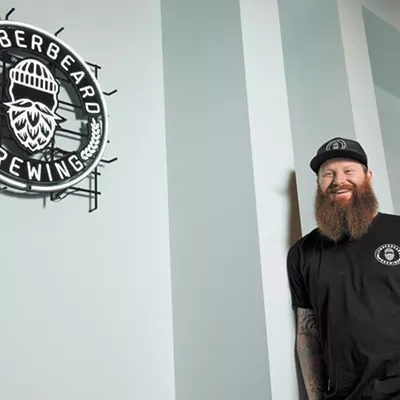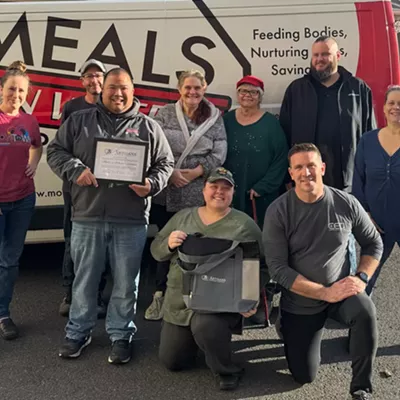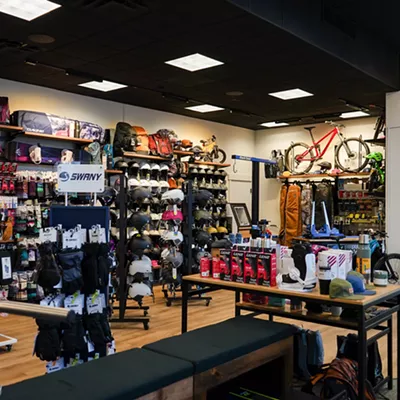
The humor, spontaneity and fun of improvisational comedy is a stark contrast to the mundanity of day-to-day life, but the Spokane School of Improv shows how on-the-spot humor can be applied to anything.
While the school is a project of the Blue Door Theatre in the Garland District, which frequently hosts comedy classes for actors and aspiring comics of all ages, its target audience is a little different. Consider these recent sessions: Improv and Poetry, Improv and the Law, and Improv and Self-Care.
"These classes are really about how you incorporate the core principles of improv into your life, or how you can use them to create improvements to your own professional and personal development," says Jim Mohr, Blue Door Theatre's president.
One of those core principles is demonstrated in an exercise called "Yes, and..." which requires actors to say "yes" to whatever their partners say, rather than shutting down their ideas.
"You are opening things up to people, you're opening yourself up to others, to different experiences, and you're finding opportunities in the things that come across you in your life and you don't turn them down," Mohr says. "It's kind of opening the door instead of closing it to opportunities."
Improv relies on active listening and mindfulness as well, he says, because if you don't pay attention to what your improv partners are saying, it's difficult to create a cohesive story. Going with the flow, thinking quickly on your feet, and coming up with stories and characters on the spot until the end of a game or scene are skills crucial to improv.
Mohr envisions that some Spokane School of Comedy classes, such as Improv and Self-Care, may be offered regularly, but sessions focused on specific careers may rotate to give a broader range of professionals the chance to experience how improv techniques can be applied to their daily lives and work.
Niche classes like Improv and the Law may not seem like an apt combination, but storytelling is a key component of improv that lawyers can use to strengthen a case. This particular session is led by Blue Door artistic director Frank Tano, who also works as a legal assistant at a local law firm.
"The improv for lawyers class is going to be focused on using improv in a few ways — improv for storytelling, how to improve the ability to tell your client's story," Mohr says. "It's also focused on how improv can prepare people for if they have to go to court."
Improv and Self-Care, meanwhile, focuses on how to use improv to combat anxiety, which often prevents people from doing certain things out of fear. To Mohr, one of the most important aspects of improv is that it frames failure as a positive experience rather than a negative one.
"It's really about accepting that failure is a part of life, and if it happens, it's OK, you can recover," he says. "Part of that comes from having a supportive team."
Spokane School of Improv's first class, Improv and Poetry, was composed of a small group of students who, due to poetry's element of public performance, may be more comfortable than others with being in an open, vulnerable environment. The eight-week class kicked off in early March.
Each session incorporated an equal amount of improv and poetry exercises, allowing students to apply improv's free-flowing style to the more structured art of poetry.
For their third meeting, for example, instructor Heather Tillery had students begin with a storytelling-based improv exercise during which students took turns narrating classic fairy tales on the spot while adding their own positive or negative twists to the original narrative. Tillery encouraged them to let their imagination run free while simultaneously developing complex stories. The class then applied what they learned from the game during a five-minute poem-writing break.
"I felt like the two together felt really important because poetry can be so individual, and I think just pairing the two, the improv piece allows for that community building and that experience being accepted," she says.
To Tillery, both improv and poetry rely on allowing oneself to dive deep into the outside world but also inward into the mind. As forms of creative expression, both art forms also give people permission to have fun and explore creativity in ways not common for most busy adults.
"There's also the permission to dive into the subconscious in both improv and poetry, and not to overthink and not to have a plan. Those are not typical things society promotes," she says. "I think it's just building trust in yourself and in that community, and integrating the body with the mind."
Even outside the class, one of Tillery's students feels that the tools he learned are crucial to many areas of life.
"I think improv helps to build resiliency and adaptability," says Sky Pagaling. "I think that's a great exercise for resiliency in the outside world because every day we run into things that we're not expecting, so having the ability to come up with some type of solution on your own is a great skill to have." ♦
SPOKANE SCHOOL OF IMPROV
New School of Improv sessions are set to return in fall 2023, while other comedy classes and events are offered regularly by the Blue Door Theatre. Find out more at spokaneschoolofimprov.org and bluedoortheatre.com.





















